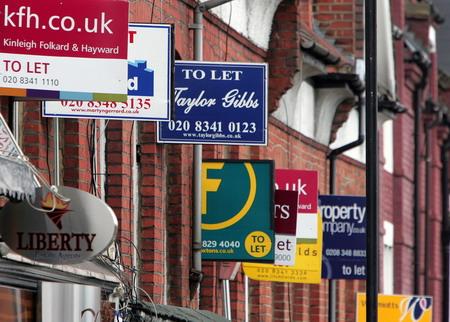
Estate agents' signs on buildings in London. Overseas nationals purchased 28 percent of the resale properties across all prime sites in the British capital last year. [Photo / Bloomberg]
BEIJING - An increasing number of China's rich are snapping up properties overseas in the expectation that domestic inflation will continue to rise after the consumer price index reached a 34-month high in May.
According to Colliers International, a real estate service provider, the proportion of Chinese buyers in Vancouver's property market is on the rise. At the end of the first quarter this year, it increased to 29 percent of all homebuyers.
In the past six months, Chinese spent 1.3 billion yuan ($200 million) through Colliers' international property department, with Canada, the UK and Australia topping the buying list.
"We are expecting a clear increase in the extent of mainland buyers' purchases of overseas properties this year because of the government's rigorous restraint on the number of homes a family can buy in key cities," said Alan Liu, managing director of Colliers International (North Asia).
Due to the latest financial push from China, the average price of a home in Greater Vancouver rose 12 percent in 2010 and is expected to rise another 3 percent this year, according to the Canada Mortgage and Housing Corporation.
Demand from mainland immigrants now accounts for 29 percent of all new homes in Vancouver.
The situation in London is similar. Last year, overseas nationals purchased 28 percent of all resale properties across all prime London sites and 54 percent by value in the prime central London area in the more than 5 million pound ($8 million) price bracket, according to a recent report by Savills research.
"If the money from China were to start flowing into London at the same rate it does from billionaires in other countries, we would expect the value of ultra-prime London properties to grow by as much as 15 per cent," said Yolande Barnes, head of Savills residential research. "The issue at present is that Chinese buyers aren't taking, or can't take, their money out of China."
The biggest increase in global billionaires since 2007 has occurred in China and the Commonwealth of Independent States (CIS). While CIS buying activity has been strong, accounting for 15 percent of prime central London purchases by value, Chinese billionaires have yet to have a real impact, accounting for just 3 percent of prime central London resale purchases by value.
But more Chinese from the mainland are seeking various ways to manage their wealth globally.
"An increasing number of people from the Chinese mainland came to us and put their money into a property trust unit in Jersey to save VAT and avoid heritage tax as well as capital gains tax when trading again," said Geoff Cook, chief executive of Jersey Finance, situated on the British island which is a noted offshore financial center.
"Purchasing properties is necessary for the super-rich to allocate their resources globally, but it might not be a good choice for domestic investors from the middle class because it implies that you are betting on the depreciation of the renminbi," said an industry expert helping people purchase properties overseas who declined to be named. "Meanwhile, property prices in mature markets are usually steady, without too much room for price appreciation."





